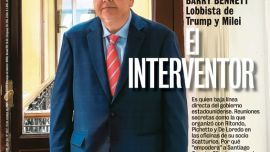After two years of harsh spending cuts, amid rumours of a devaluation and a run on the peso, why did Argentines support President Javier Milei in Sunday’s legislative elections?
Milei’s success in lowering inflation, the fear of economic collapse and rejection of Peronism carried the day for the wild-haired economist, say voters and analysts.
Among the relieved is administrative worker Juan Salvatori, who believes Milei’s victory “will at least bring a bit of calm after so much uncertainty about what might have happened if things had gone badly.”
Another worker, Patricio Mejuto, 37, said he too backed the government, despite noting missteps.
“They got it wrong with [welfare for] pensioners and with the Garrahan Children’s Hospital,” which has suffered severe budget cuts, “but things can be sorted out – he still has time,” said Patricio.
A weakened opposition
Milei’s La Libertad Avanza (LLA) party won more than 40 percent of the vote, compared with 31.6 percent for the opposition Peronist coalition and its allies.
Rejection of Peronism “carried more weight” than the recent political and corruption scandals surrounding Milei’s government, the run on the peso and “the fatigue with the President’s leadership style,” said political scientist Carlos Fara.
After Congress blocked Milei’s vetoes of laws updating funding for state universities, healthcare and disability programmes – which have lay stagnant since 2023 despite triple-digit inflation – “society went to the polls exhausted, disillusioned and with little energy,” added Fara.
This was reflected in the low turnout – around 67 per cent, the lowest figure since 1983 in a country with compulsory voting.
For the opposition, “there was not only no self-criticism for the disasters of previous governments, but also no new or better ideas about how to respond to the reform agenda proposed by the government,” said political analyst Sergio Berensztein.
The opposition’s message focused on “putting the brakes on Milei,” added political scientist Carlos Germano.
“Many sectors opted for change when faced with an opposition that was offering more of the same, without any alternative to Milei’s economic plan or overall project,” Germano said.
Victorio, a 70-year-old who preferred not to give his surname, voted for Milei despite admitting he “knows little about politics.”
“Despite his mistakes, economically he’s trying to pull Argentina out of the hole previous governments dug,” said the pensioner.
Economic trauma
Voters value slowing inflation despite the social pain caused by Milei’s austerity “chainsaw,” which fell unevenly on vulnerable sectors such as pensioners and hit the purchasing power of the middle class – the engine of consumption, which has collapsed.
Tens of thousands of jobs have also been lost, wages have fallen, and funding for science, education, health and public works has been cut, all in pursuit of fiscal targets.
Despite signs of a recession, the “traumatic memory” of inflation prevailed, said analyst Shila Vilker, director of Trespuntozero consultancy firm.
“I wouldn’t underestimate the importance of stability and control over inflation, which for a large part of the Argentine psyche is something extremely valued,” Vilker added.
US lifeline
After four weeks of currency turmoil, fears of a financial collapse also weighed heavily.
The emergence of a proposal to overcome the crisis through a US$20-billion aid package from the United States – which US President Donald Trump himself conditioned on an electoral success for Milei – also played a part in the campaign.
“The appearance of US assistance during the campaign helped prevent the dollar crisis from spiralling out of control; with that support, things calmed down,” said Germano.
Vilker also referred to the role of the US president. “It’s a controversial issue, much criticised by one part of the Argentine population,” who saw it as interference.
“But it was also highly valued by another significant segment of voters as a timely lifeline,” she added.
Germano believes that US assistance was important for Milei’s victory “but not decisive.”
What mattered most, he said, was “the bet on a process of change that’s only halfway through – with many mistakes still to be corrected, but preferable to what came before, which people already knew all too well.”
related news
by Sonia Avalos & Tomás Viola, AFP























Comments